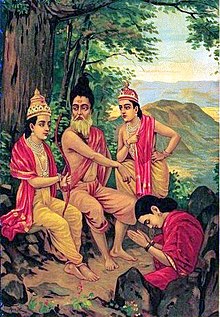Viswamitra
| Brahmarshi Vishvamitra | |
|---|---|

Rama releasing Ahalya from curse. Lakshmana and sage Vishvamitra are present
|
|
| Religion | Hinduism |
| Children |
|
| Parents |
|
| Honors |
Rishi Rajarshi Maharishi Brahmarshi |
| Lineage | Kusha - Chandravamsha clan |
| Composed Mandala 3 of Rigveda, Gayatri Mantra, Ram Raksha Stotra | |
Brahmarshi Vishvamitra (viśvā-mitra) is one of the most venerated rishis or sages of ancient India. He is also credited as the author of most of Mandala 3 of the Rigveda, including Gayatri Mantra. The Puranas mention that only 24 rishis since antiquity have understood the whole meaning of—and thus wielded the whole power of—Gayatri Mantra. Vishvamitra is supposed to be the first, and Yajnavalkya the last.
The story of Vishvamitra is narrated in the Balakanda of Valmiki Ramayana.Mahabharata adds that Vishvamitra's relationship with Menaka resulted in a daughter, Shakuntala, whose story is narrated in Adi Parva of Mahabharata.
Vishvamitra was a king in ancient India, also called Kaushika (descendant of Kusha). Vishwamitra was originally the Chandravanshi King of Kanyakubja. He was a valiant warrior and the great-grandson of a great king named Kusha. Valmiki Ramayana, prose 51 of Bala Kanda, starts with the story of Vishvamitra:
There was a king named Kusha (not to be confused with Kusha, son of Rama), a brainchild of Brahma and Kusha's son was the powerful and verily righteous Kushanabha. One who is highly renowned by the name Gaadhi was the son of Kushanabha and Gaadhi's son is this great-saint of great resplendence, Vishvamitra. Vishvamitra ruled the earth and this great-resplendent king ruled the kingdom for many thousands of years.
His story also appears in various Puranas; however, with variations from Ramayana. Vishnu Purana and Harivamsha chapter 27 (dynasty of Amaavasu) of Mahabharata narrates the birth of Vishvamitra. According to Vishnu Purana, Kushanabha married a damsel of Purukutsa dynasty (later called as Shatamarshana lineage - descendents of the Ikshvaku king Trasadasyu) and had a son by name Gaadhi, who had a daughter named Satyavati (not to be confused with the Satyavati of Mahabharata).
...
Wikipedia
